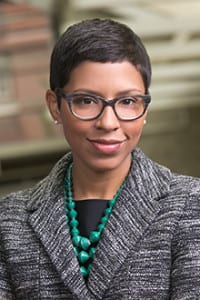
By Andrew Cohen
Professor Melissa Murray sees the Center on Reproductive Rights and Justice (CRRJ) as a tile that fits perfectly within Berkeley Law’s mosaic: ambitious, pioneering, and focused on using teaching and scholarship to make a meaningful impact on laws and policies that serve the public interest.
As CRRJ’s new faculty director, Murray wants to accelerate the already rapid progress the center has made since launching in July 2012. The nation’s first law school think tank to focus on reproductive rights and justice issues, CRRJ examines the legal, economic, and social impact these issues have on women, families, and communities.
“We’ve served as a resource, liaison, and partner to reproductive rights and justice organizations in California and throughout the country,” Murray said. “Going forward, we hope to continue what we’ve been doing, but on a more expansive scale. We want to create a physical and virtual hub where advocates and scholars can create a community with others who are working on these issues, cross-pollinate ideas, and collaborate on projects.”
Since joining the Berkeley Law faculty in 2006, Murray has taught a range of courses that include Family Law, Criminal Law, and Constitutional Law. This fall, she will teach Reproductive Rights and Justice—which became oversubscribed soon after course enrollment began.
Murray received Berkeley Law’s annual Rutter Award for Teaching Distinction for the 2013-14 school year, and has won several national awards for her scholarship. Her work focuses on how law articulates the legal parameters of intimate life, and encompasses topics such as marriage equality, the legal regulation of sex and sexuality, and the legal recognition of caregiving.
“Melissa is bringing her incomparable intellect, charisma, and competence to bear on CRRJ,” said Jill E. Adams ’06, the center’s executive director. “Her talents will catapult us toward our goals, and her ideas will catalyze new ventures.”
Pioneering projects
A major achievement in Murray’s scholarship is Cases on Reproductive Rights and Justice, the nation’s first legal casebook covering laws and policies that regulate sex, reproduction, bodies, and families. She co-authored the book, published in November 2014 by Foundation Press, with recently retired professor and outgoing CRRJ faculty director Kristin Luker.
“We’ve been delighted by the public response to the casebook, which has been overwhelmingly positive,” Murray said. “We cannot overstate CRRJ’s contributions to the casebook effort. Jill Adams and our student volunteers provided so much editorial support and general encouragement at every stage of the project.”
Though many consider “reproductive rights” a synonym for abortion, the casebook—and the center’s programs—extend far beyond that issue. Amid the heated national debate over abortion, many larger issues of women’s health, liberty, and dignity have been obscured. Murray and her colleagues at CRRJ are concerned about state regulation of sexuality, pregnancy, family formation, and more—particularly for communities that are traditionally marginalized and cut off from access to reproductive services.
“CRRJ has always focused on issues that affect poor and low-income people’s reproductive experiences,” Murray said. “That won’t change as we continue to grow. For the next three years we’ll focus on questions related to young women on public assistance and public support of reproductive care, as well as the burgeoning issue of abortion self-induction and telemedicine.”
The center houses a year-round working group of students, researchers, faculty, and community members; a seminar for law and other graduate students; and a virtual library with a searchable catalogue of annotated resources. It also hosts conferences, lectures, and a writing workshop in which scholars, advocates, and graduate students work toward publication in peer-reviewed journals and law reviews.
With the recent Planned Parenthood firestorm and Senate vote not to defund the organization, the spotlight on reproductive justice issues has rarely been brighter. With a new school year beginning, Murray is eager to tap the passion and talents of Berkeley Law students involved with the center.
“They will continue to advance CRRJ’s mission through their law and policy research as interns, as well as their participation in programs such as the Reproductive Justice Working Group,” she said. “It’s a pleasure to teach and work with such committed and hard-working students. We’re delighted that CRRJ is training the next generation of lawyers and policymakers who will take on these important issues in the years to come.”